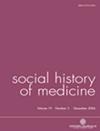二十世纪五六十年代的法国精神病学与酗酒:门诊治疗的悖论
IF 0.7
2区 哲学
Q1 HISTORY
引用次数: 0
摘要
摘要 本文探讨了二十世纪五六十年代法国精神病学中酗酒患者的地位,当时法国精神病学改革刚刚起步。文章依据医学文献、国家和部门档案,以及 20 世纪 50 年代初在巴黎开设的首批抗酒精中毒诊室中至今未被利用的患者档案,展示了新疗法和药物(如双硫仑)如何重新激发了精神病医生对酒精中毒的兴趣,并使酒精中毒患者的门诊治疗成为可能。然而,对病人轨迹的研究表明,门诊治疗并不能取代住院治疗。文章随后分析了精神科医生与患者之间的关系如何在会诊框架内发生转变,并将社会工作者和家庭成员等新的利益相关者纳入其中。文章最后解释了为什么在二十世纪六十年代末,治疗热情让位于对精神科医生在酗酒治疗中作用的日益怀疑。本文章由计算机程序翻译,如有差异,请以英文原文为准。
French Psychiatry and Alcoholism in the 1950s and 1960s: The Paradoxes of Outpatient Care
Summary This article examines the place of alcoholic patients in French psychiatry in the 1950s and 1960s, an era of incipient psychiatric reform. Relying on medical literature, national and department archives, as well as hitherto unexploited patient files from one of the first anti-alcoholic consultations opened in the early 1950s in Paris, it shows how new therapies and drugs, such as disulfiram, revived the interest of psychiatrists for alcoholism and enabled the outpatient treatment of alcoholics. However, the study of patient trajectories reveals that ambulatory care did not substitute itself for hospitalisation. The article then analyses how the psychiatrist–patient relation was transformed in the framework of the consultation, and included new stakeholders such as social workers and family members. It finally explains why therapeutic enthusiasm gave way, at the end of the 1960s, to increasing doubts concerning the role of the psychiatrist in the cure of alcoholism.
求助全文
通过发布文献求助,成功后即可免费获取论文全文。
去求助
来源期刊

Social History of Medicine
社会科学-科学史与科学哲学
CiteScore
1.60
自引率
0.00%
发文量
63
审稿时长
>12 weeks
期刊介绍:
Social History of Medicine , the journal of the Society for the Social History of Medicine, is concerned with all aspects of health, illness, and medical treatment in the past. It is committed to publishing work on the social history of medicine from a variety of disciplines. The journal offers its readers substantive and lively articles on a variety of themes, critical assessments of archives and sources, conference reports, up-to-date information on research in progress, a discussion point on topics of current controversy and concern, review articles, and wide-ranging book reviews.
 求助内容:
求助内容: 应助结果提醒方式:
应助结果提醒方式:


